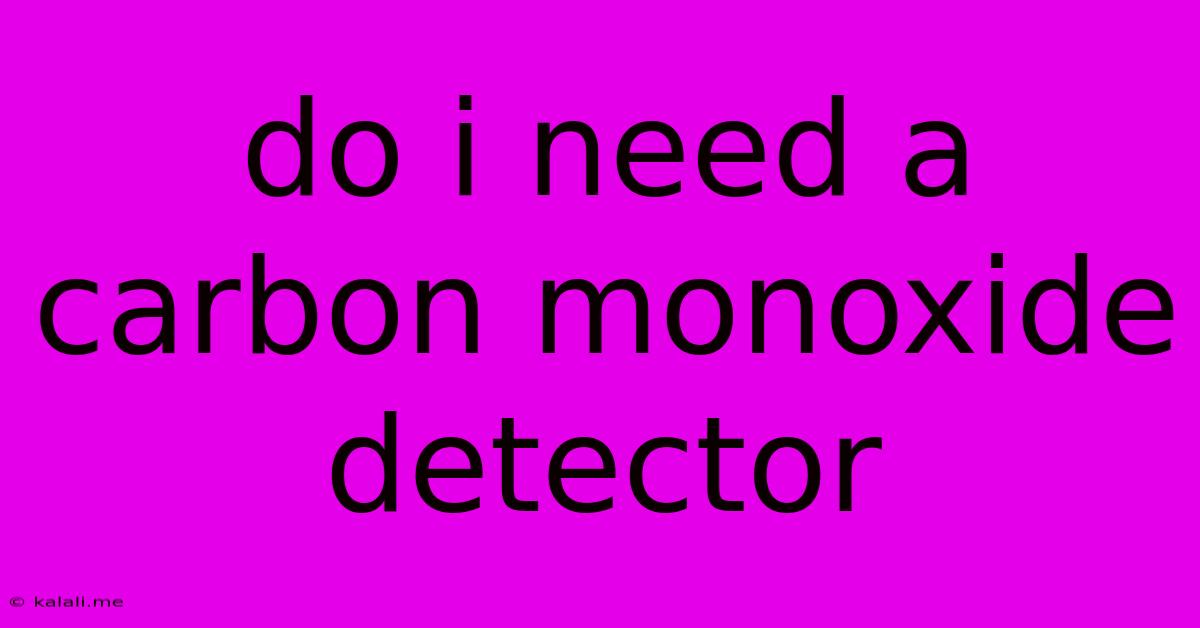Do I Need A Carbon Monoxide Detector
Kalali
Jun 02, 2025 · 3 min read

Table of Contents
Do I Need a Carbon Monoxide Detector? A Comprehensive Guide to Safety
Carbon monoxide (CO) is a silent killer. Invisible, odorless, and tasteless, it can quickly build up in your home, leading to serious health problems or even death. This is why having a working carbon monoxide detector is crucial for the safety and well-being of you and your family. This article will explore why you need a CO detector, where to place them, and what to do if your alarm goes off.
Why is a Carbon Monoxide Detector Essential?
Carbon monoxide is produced when fuels like natural gas, propane, oil, and wood don't burn completely. Common sources in the home include:
- Furnaces and boilers: Regular maintenance is key, but malfunctions can still lead to CO leaks.
- Gas stoves and ovens: Ensure proper ventilation when using these appliances.
- Water heaters: Check for any unusual noises or smells.
- Fireplaces and wood-burning stoves: Improper ventilation can create a dangerous build-up of CO.
- Gas-powered generators: Never run these indoors or in enclosed spaces.
- Cars: Never run a car in an attached garage.
Symptoms of Carbon Monoxide Poisoning:
The symptoms of CO poisoning can be subtle and easily mistaken for the flu or other illnesses. These include:
- Headache: This is often one of the first symptoms.
- Dizziness: Feeling lightheaded or unsteady.
- Weakness: General fatigue and lack of energy.
- Nausea and vomiting: Gastrointestinal distress.
- Shortness of breath: Difficulty breathing.
- Confusion: Mental fogginess and disorientation.
- Chest pain: In severe cases.
Where to Place Carbon Monoxide Detectors:
The placement of your detectors is crucial for effective monitoring. Follow these guidelines:
- On each level of your home: Including the basement.
- Outside each sleeping area: Ensure protection for everyone in the house.
- Near fuel-burning appliances: This allows for quicker detection of leaks.
- At least 15 feet from fuel-burning appliances: Avoid false alarms caused by proximity.
Types of Carbon Monoxide Detectors:
There are several types of CO detectors available, each with its own advantages:
- Battery-powered: Portable and easy to install. Requires regular battery changes.
- Plug-in: Convenient and simple to use. Relies on mains power, so may not work during a power outage.
- Combination smoke and CO detectors: Offer dual protection in a single unit, saving space.
What to Do if Your Carbon Monoxide Detector Goes Off:
- Evacuate immediately: Get everyone out of the house and move to a safe distance.
- Call 911 or your local emergency services: Seek medical attention immediately.
- Do not re-enter your home until the authorities have declared it safe.
- Have a qualified technician inspect your home's heating and fuel-burning appliances.
In Conclusion:
Investing in a carbon monoxide detector is an investment in your family's safety. The peace of mind it provides is invaluable, and the cost is far less than the potential consequences of CO poisoning. Don't wait until it's too late – protect your loved ones today. Choose the right detector for your needs and ensure it's properly installed and maintained for optimal safety. Regular testing and battery replacement are vital aspects of ensuring its continuous effectiveness.
Latest Posts
Latest Posts
-
Denver To Salt Lake City Driving
Jun 04, 2025
-
Can You Use Coconut Oil To Fry
Jun 04, 2025
-
2014 Ford Fusion Radio Wiring Diagram
Jun 04, 2025
-
How To Fill Gaps In Wooden Floors
Jun 04, 2025
-
How Long Are Credits In Movies
Jun 04, 2025
Related Post
Thank you for visiting our website which covers about Do I Need A Carbon Monoxide Detector . We hope the information provided has been useful to you. Feel free to contact us if you have any questions or need further assistance. See you next time and don't miss to bookmark.